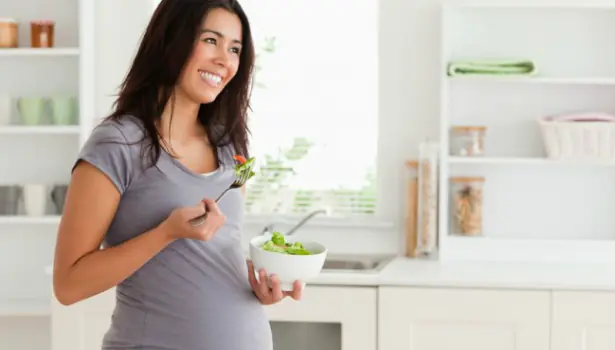Pregnancy is a special period when a woman should pay special attention to her health and proper nutrition, because this not only concerns herself, but also her unborn baby. There is a lot of conflicting information regarding what a woman should and should not eat during pregnancy. To understand this issue, we turn to the research of nutritionist Elizabeth Ward, author of the book Expect the Best, During, and After Pregnancy. In her work, she identified 8 main products that must be included in a pregnant woman’s diet.
-
Eggs
Eggs are one of the healthiest foods for pregnant women. They contain choline, which is necessary for the production of a number of hormones and maintaining the body's immune functions. Eggs are also rich in protein, which is the basis for the construction of new cells in the baby’s body. It is recommended to consume one or two boiled or fried eggs per day as part of a balanced diet. -
Salmon
Salmon meat is an excellent source of phosphorus, potassium, vitamins B1, PP and omega-3 fatty acids, which have a beneficial effect on the nervous and digestive systems and regulate blood sugar levels. Additionally, salmon has much lower levels of methylmercury than other seafood, making it safe for pregnant women to consume. It is recommended to consume no more than 50 g of salmon daily. -
Beans
Black beans, lentils, and beans contain a lot of protein and fiber, which are necessary to improve intestinal and kidney function, lower blood cholesterol and provide the body with zinc, iron, folate and calcium. Legumes have no restrictions on daily consumption. -
Walnut
Walnuts are an alternative source of omega-3 for those who don't like fish and eggs. It contains proteins, carbohydrates, iodine, potassium, calcium, iron, phosphorus, glutamine, vitamins E, PP, K and provitamin A. Eating walnuts will help strengthen the immune system and liver, normalize gastric secretion, restore the body's energy reserves, strengthen muscles and relieve fatigue. It is recommended to consume 100 g of walnuts per day. -
Fruits and vegetables
Fruits and vegetables are not only a source of vitamins and minerals, but also a source of antioxidants, which help pregnant women fight the effects of free radicals and prevent cell damage. It is recommended to eat a variety of fruits and vegetables, including citrus fruits, berries, red and green peppers, broccoli, spinach, carrots and pumpkin. -
Oatmeal
Oatmeal is a source of vegetable protein, iron, copper, zinc, magnesium, phosphorus and vitamins B1 and B6. It helps lower blood cholesterol, improve the functioning of the cardiovascular system, normalize hormone levels and strengthen the immune system. It is recommended to eat oatmeal for breakfast at least three times a week. -
Dairy products
Fermented milk products such as yogurt, kefir and cottage cheese contain probiotics, which help improve bowel function and strengthen the immune system. In addition, they are rich in calcium, vitamins B2 and B12, which are essential for healthy bones and the nervous system. It is recommended to consume fermented milk products daily. -
Water
Water is an important element of a healthy diet during pregnancy. It helps the body maintain optimal levels of hormones and fluids necessary for the proper functioning of all body systems. It is recommended to drink at least 8-10 glasses of water per day.
It is important to take into account the individual characteristics of the body and consult a doctor before changing your diet.



